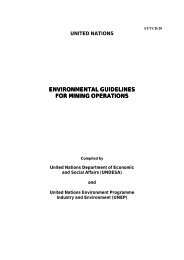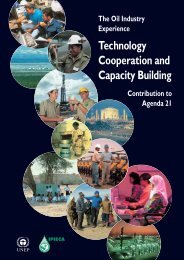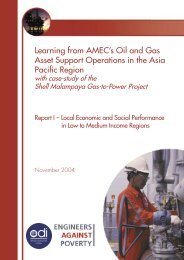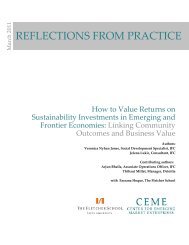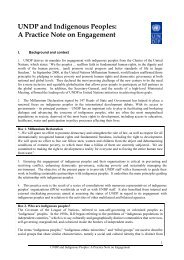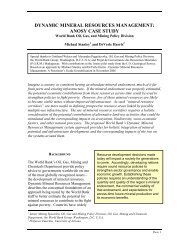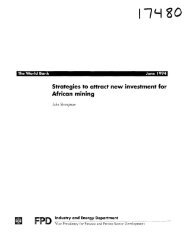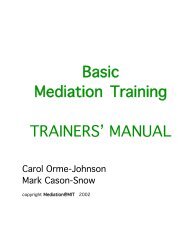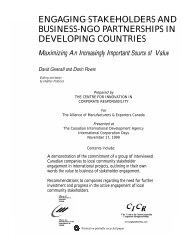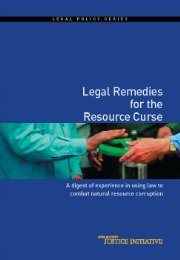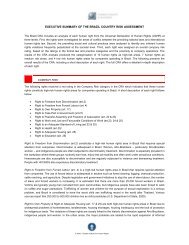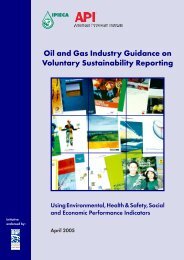- Page 1 and 2:
A set of 20 revised andupdated tool
- Page 3 and 4:
PrefaceBackground to the projectTar
- Page 6 and 7: IntroductioncontinuedINTRODUCTIONTh
- Page 8 and 9: IntroductioncontinuedINTRODUCTIONTa
- Page 10: ➜Table 2: Community development t
- Page 13 and 14: MINING AND COMMUNITYDEVELOPMENTGoal
- Page 15 and 16: Mining and community developmentThe
- Page 17 and 18: Mining and community developmentcon
- Page 19 and 20: Mining and community developmentcon
- Page 21 and 22: Mining and community developmentcon
- Page 23 and 24: Mining and community developmentcon
- Page 25 and 26: Mining and community developmentcon
- Page 27 and 28: Mining and community developmentcon
- Page 29 and 30: Mining and community developmentcon
- Page 31 and 32: Mining and community developmentcon
- Page 33 and 34: The tools provide practicalguidance
- Page 35 and 36: Community development toolsUsing th
- Page 37 and 38: CASE STUDYEarly participatory plann
- Page 39 and 40: Community development toolscontinue
- Page 41 and 42: The central set of activitiesthat u
- Page 43 and 44: Relationships toolsTOOL 1TOOL 2TOOL
- Page 45 and 46: Stakeholder Identification1Descript
- Page 47 and 48: Stakeholder Identification1continue
- Page 49 and 50: Stakeholder Identification1continue
- Page 51 and 52: CASE STUDY continuedStakeholder map
- Page 53 and 54: Stakeholder Analysis2DescriptionOnc
- Page 55: Stakeholder Analysis2continuedTable
- Page 59 and 60: Consultation Matrix3continuedSTEP 1
- Page 61 and 62: CASE STUDYPre-operational implement
- Page 63 and 64: Partnership Assessment4DescriptionT
- Page 65 and 66: Partnership Assessment4continuedPur
- Page 67 and 68: Etc.VocationaleducationChildmalnutr
- Page 69 and 70: Partnership Assessment4continuedSTE
- Page 71 and 72: CASE STUDY continuedStrengthening c
- Page 73 and 74: Grievance Mechanism 275DescriptionA
- Page 75 and 76: Grievance Mechanism5continuedIn add
- Page 77 and 78: Grievance Mechanism5continuedSTEP 5
- Page 79 and 80: CASE STUDYSetting up an independent
- Page 81 and 82: Planning tools are used forplanning
- Page 83 and 84: Planning toolsTOOL 6Strategic Plann
- Page 85 and 86: Strategic Planning6FrameworkDescrip
- Page 87 and 88: Strategic Planning Framework6contin
- Page 89 and 90: Strategic Planning Framework6contin
- Page 91 and 92: Strategic Planning Framework6contin
- Page 93 and 94: Community Mapping7DescriptionA comm
- Page 95 and 96: Community Mapping7continuedFigure 6
- Page 97 and 98: Institutional Analysis8DescriptionI
- Page 99 and 100: Institutional Analysis8continuedFig
- Page 101 and 102: Development Opportunity9RankingDesc
- Page 103 and 104: Development Opportunity Ranking9con
- Page 105 and 106: Table 11: Participatory assessment
- Page 107 and 108:
Development Opportunity Ranking9con
- Page 109 and 110:
Financial Valuation Tool10Sustainab
- Page 111 and 112:
Not applicable/do not know➜Table
- Page 113 and 114:
Not applicable/do not know➜Table
- Page 115 and 116:
Financial Valuation Tool10Sustainab
- Page 117 and 118:
Best practice• Negotiations with
- Page 119 and 120:
Table 14: Sustainability Program Qu
- Page 121 and 122:
CASE STUDY continuedFinancial Valua
- Page 123 and 124:
These tools help people tounderstan
- Page 125 and 126:
Assessment toolsTOOL 11Social Basel
- Page 127 and 128:
Social Baseline Study11DescriptionT
- Page 129 and 130:
Social Baseline Study11continuedWhe
- Page 131 and 132:
CASE STUDYExample of a social basel
- Page 133 and 134:
Social Impact and12Opportunities As
- Page 135 and 136:
Social Impact and12Opportunities As
- Page 137 and 138:
Social Impact and12Opportunities As
- Page 139 and 140:
Social Impact and12Opportunities As
- Page 141 and 142:
CASE STUDYContributing to community
- Page 143 and 144:
Social Impact and12Opportunities As
- Page 145 and 146:
Competencies Assessment13Descriptio
- Page 147 and 148:
Competencies Assessment13continuedH
- Page 149 and 150:
An example for a person or organiza
- Page 151 and 152:
Methods and approaches formitigatin
- Page 153 and 154:
Management toolsTOOL 14TOOL 15TOOL
- Page 155 and 156:
Community Development14AgreementsDe
- Page 157 and 158:
Community Development Agreements14c
- Page 159 and 160:
Community Development Agreements14c
- Page 161 and 162:
Management Systems15DescriptionInte
- Page 163 and 164:
CASE STUDYIncorporating impact asse
- Page 165 and 166:
Community Action Plans16Description
- Page 167 and 168:
Community Action Plans16continuedHo
- Page 169 and 170:
CAPs from adjoining communities may
- Page 171 and 172:
Community Action Plans16continuedKe
- Page 173 and 174:
Local Economic Investment17Descript
- Page 175 and 176:
Local Economic Investment17continue
- Page 177 and 178:
CASE STUDY continuedAssisting growt
- Page 179 and 180:
Resettlement Planning18DescriptionT
- Page 181 and 182:
Resettlement Planning18continuedThe
- Page 183 and 184:
CASE STUDY continuedManaging the im
- Page 185 and 186:
How to monitor and evaluatecommunit
- Page 187 and 188:
Monitoring and evaluation toolsTOOL
- Page 189 and 190:
Monitoring and evaluation toolscont
- Page 191 and 192:
Indicator Development19DescriptionE
- Page 193 and 194:
Indicator Development19continuedSTE
- Page 195 and 196:
Indicator Development19continuedTab
- Page 197 and 198:
Goal Attainment Scaling20Descriptio
- Page 199 and 200:
Goal Attainment Scaling20continuedT
- Page 201 and 202:
GLOSSARY AND REFERENCES
- Page 203 and 204:
GlossaryAArbitration A process in w
- Page 205 and 206:
GlossarycontinuedGGender The social
- Page 207 and 208:
GlossarycontinuedParticipatory Rura
- Page 209 and 210:
GlossarycontinuedStrategic planning
- Page 211 and 212:
Referenced sourcesGeneral reading -
- Page 213 and 214:
Referenced sourcescontinuedWorld Ba
- Page 215 and 216:
Referenced sourcescontinuedICMM. 20
- Page 217 and 218:
Referenced sourcescontinuedVarious
- Page 219 and 220:
Referenced sourcescontinuedStakehol
- Page 221 and 222:
DisclaimerThis publication contains


![[PDF] Community Development Toolkit - CommDev](https://img.yumpu.com/48616495/57/500x640/pdf-community-development-toolkit-commdev.jpg)

